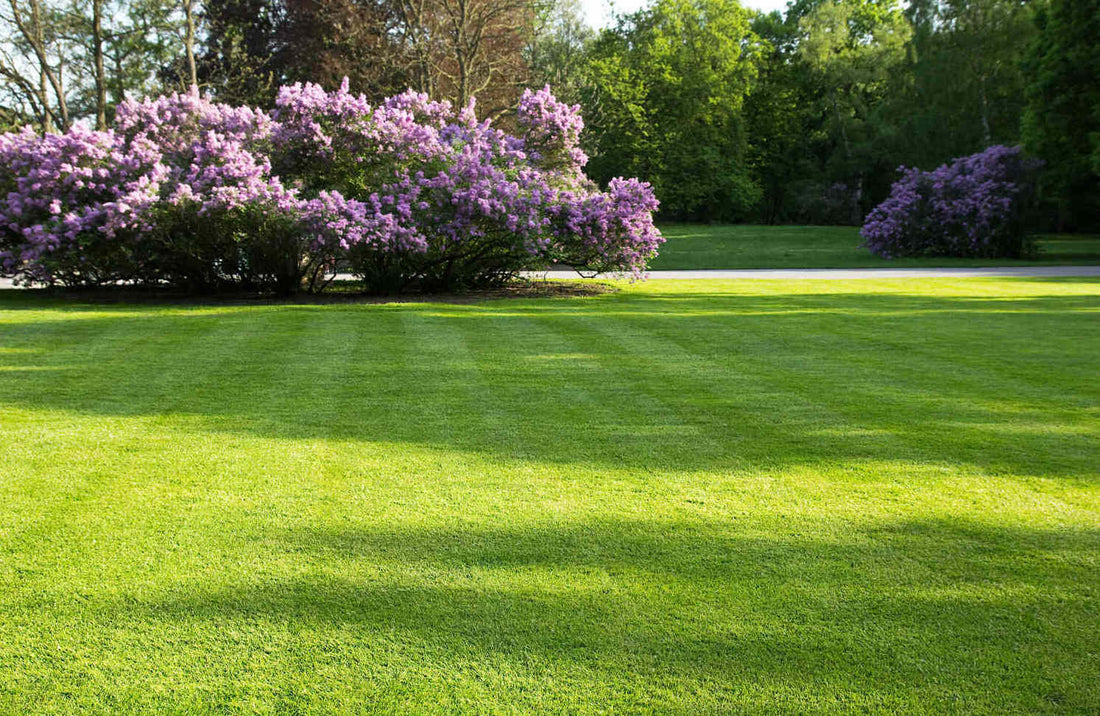Looking to achieve the best lawn in North Carolina? You've come to the right place! Whether you're starting from scratch or refreshing your yard, choosing the right grass seed is key.
As trusted experts, we know that the best grass seed for North Carolina is determined by several factors—your region's climate, soil type, and whether you prefer warm-season or cool-season grasses.
In this article, we'll dive deeper into the best grass seed options for your North Carolina lawn, offering expert tips to help you decide.
So, if you're ready to transform your yard into a lush, green paradise, keep reading as we guide you step by step through the process!
What this article covers:- How to Choose the Best Grass Seed for North Carolina
- Understanding North Carolina's Climate
- What to Consider Before Picking a Grass Seed
- The Best Grass Seeds for North Carolina
- Cool-Season Grasses
- When to Plant for the Best Results
How to Choose the Best Grass Seed for North Carolina
Choosing the right grass seed for North Carolina requires careful consideration of both your environment and the goals you have for your lawn.
North Carolina's weather ranges from hot, humid summers to cool winters, so it's crucial to select grass that can withstand these conditions.
If you're aiming for a durable lawn, think about whether warm-season or cool-season grass fits your needs better.
Warm-season grasses are ideal for handling the intense summer heat, while cool-season varieties are better suited for areas with cooler fall and winter temperatures.
Additionally, pay attention to your soil type—whether it's sandy, clay-heavy, or loamy—and how much sun your yard gets.
For a successful lawn, you should plant grass that matches both your local climate and the specific conditions in your yard.
By focusing on these factors, you can confidently choose the best grass seed for North Carolina, ensuring long-lasting growth and a lawn that thrives year-round.
Understanding North Carolina's Climate
North Carolina's climate can vary, but overall, it has hot summers and mild to cool winters.
This makes both warm-season and cool-season grasses viable options, depending on which part of the state you live in.
In the warmer southern regions, warm-season grasses tend to perform better. Meanwhile, cool-season grasses can thrive in the northern, higher elevation areas.
What to Consider Before Picking a Grass Seed
Before you choose the right grass seed for your lawn, there are several key factors to evaluate to ensure your grass thrives in your specific environment.
- Sunlight: Consider how much sunlight your lawn receives throughout the day. Does your lawn get full sun or is it mostly shaded? Some grass varieties, like Bermuda grass, thrive in full sun, while others, like Fescue, perform better in shady areas.
- Soil: Understanding your soil type is crucial. Is your soil sandy, loamy, or clay-heavy? Sandy soils drain quickly, so you may need a drought-resistant grass, while clay-heavy soils hold moisture longer, meaning you should choose a grass type that tolerates soggy conditions. Loamy soil, on the other hand, supports a wider range of grasses.
- Watering: Evaluate how often you can water your lawn. If you live in an area with water restrictions or prefer low-maintenance lawns, opt for drought-resistant grasses like Zoysia or Bermuda. If regular watering isn't an issue, grasses like Kentucky Bluegrass may be a better option.
By taking these factors into account, you'll have a better understanding of which grass type will give you the best results.

The Best Grass Seeds for North Carolina
Let's dive into some of the best grass seed options for North Carolina, based on whether you're leaning toward warm-season or cool-season grasses.
Warm-Season Grasses
Warm-season grasses thrive in the southern regions of North Carolina. They are heat-tolerant and require less water once established. Warm season lawns such as zoysia and bermuda are best installed as sod.
Centipede Grass
Centipede grass is an excellent choice for those looking for a low-maintenance lawn. It is particularly well-suited for sandy, acidic soils and requires minimal care once established.
One of the key benefits of centipede grass is that it doesn't need frequent mowing, making it ideal for homeowners who prefer a more hands-off approach.
This grass type thrives in areas with poor soil conditions where other grasses might struggle. Additionally, centipede grass performs best in full sun but can tolerate partial shade, further enhancing its versatility.
If you're searching for a grass variety that demands less time and effort while still providing a lush, green appearance, centipede grass is an optimal option for your lawn.
Bermuda Grass
Bermuda grass is a top choice for lawns in North Carolina due to its durability and ability to withstand the state's hot and humid summers.
This grass thrives in full sun, making it perfect for areas that receive a lot of direct sunlight throughout the day. It is highly tolerant of heat and drought conditions, which means less watering is required during dry periods.
Additionally, Bermuda grass is ideal for high-traffic areas, such as backyards or sports fields, as it can recover quickly from wear and tear. Its dense growth pattern helps crowd out weeds, reducing the need for herbicides.
If you're looking for a grass type that can handle heavy use while still maintaining a lush, green appearance, Bermuda grass is an excellent option.
Our observations show that Bermuda grass performs exceptionally well in the southern regions of North Carolina, where the climate suits its warm-season growth habits.

Zoysia Grass
Zoysia grass is known for providing a thick, lush lawn that enhances the look of any yard. Its dense growth pattern not only gives a luxurious appearance but also helps prevent weeds from taking over.
Zoysia is highly drought-resistant, making it an excellent option for areas that experience dry spells or where water conservation is important.
It also tolerates moderate shade, which is beneficial for North Carolina yards that may not receive full sunlight throughout the day.
Its ability to thrive in both sun and shade, along with its durability, makes it a versatile and practical choice for homeowners looking to maintain a healthy, attractive lawn with less frequent watering.
If you're looking for a reliable and low-maintenance grass, Zoysia can handle the job.
Our findings show that Zoysia grass performs exceptionally well in a variety of soil types and climates, making it a perfect option for many North Carolina landscapes.
Cool-Season Grasses
If you live in the cooler regions of North Carolina, or you are interested in a green lawn year round, then cool-season grasses are your best bet.
Tall Fescue
Tall fescue is an excellent choice for North Carolina lawns because of its ability to withstand both heat and cold, making it versatile for the state's transitional climate zones.
The Envy Turf Type Tall Fescue Grass Seed offers an exceptional blend that guarantees a lush and luxurious lawn.
One of the key benefits of this blend is its superior disease resistance, and drought tolerance which keeps your lawn healthy and vibrant throughout the year.
Additionally, the seed mix is designed for high wear tolerance, meaning it can handle heavy foot traffic without losing its resilience. Whether your lawn is a play area for kids or a space for outdoor gatherings, it will stay lush and inviting.
Another advantage is its rapid germination, allowing you to enjoy a green, full lawn faster than with many other grass types.
If you're looking for a durable and low-maintenance option that performs well in North Carolina's diverse conditions, Tall Fescue is the perfect grass for your yard.

Perennial Ryegrass
Perennial ryegrass is an excellent choice for overseeding and quickly filling in thin or patchy areas of a lawn. However, it is not best for lawns in North Carolina unless it's used to overseed bermuda lawns during the winter months.
Its fast germination rate allows it to establish quickly, making it perfect for those looking to improve the overall appearance of their yard in a short amount of time.
Our observations show that perennial ryegrass is particularly useful for overseeding existing bermuda lawns, as it integrates well with other grass types, creating a thicker, more resilient turf.
It also thrives in cool climates and can tolerate regular foot traffic, making it ideal for busy outdoor spaces.
Additionally, its fine texture and deep green color give any lawn an attractive, well-maintained look.
Whether you're dealing with thin spots or simply want to boost the density of your lawn, perennial ryegrass is a reliable and effective option for rapid, noticeable results.
Kentucky Bluegrass
Kentucky bluegrass is prized for its ability to create a thick, lush lawn with a deep green color, offering a beautiful aesthetic that stands out in any yard.
It thrives in cooler climates, making it an ideal option for homeowners in North Carolina's mountainous regions where temperatures are lower.
This grass is particularly well-suited for cooler weather because it prefers moderate conditions and can handle frosts better than many other grass types.
Kentucky bluegrass also spreads through rhizomes, which allows it to fill in bare spots and create a dense, uniform lawn.
Its ability to recover from wear and tear, combined with its visual appeal, makes it a popular choice for those looking for a resilient yet attractive lawn.
Based on our observations, Kentucky bluegrass is a top choice for North Carolina's cooler areas, providing both beauty and durability for yards in these regions.

When to Plant for the Best Results
When planting grass seed, getting the timing right is crucial for optimal growth.
Our findings show that warm-season grasses, such as Bermuda or Zoysia, can be installed at any time of the year using sod.
This allows the grass to establish itself during the peak growing season. In contrast, cool-season grasses, like Kentucky bluegrass or tall fescue, should be planted in early fall.
This is when the soil retains warmth from summer, but cooler air temperatures reduce stress on the young grass.
By planting at the right time, you ensure that your grass has the best conditions to develop strong roots and grow into a healthy, lush lawn.
Conclusion
Finding the right grass seed can completely change the look and feel of your yard. From handling the intense heat of the southern regions to thriving in the cooler mountain areas, the key is selecting the seed that matches your environment.
Whether you're searching for the best grass seed for South Carolina, the best grass seed for Texas, or even the best grass seed for New England, understanding your region's specific needs is essential.
At Lawn Synergy, we're dedicated to helping you achieve the perfect lawn with expert advice and high-quality grass seed blends tailored to your climate.
Ready to elevate your lawn care? Trust Lawn Synergy to guide you in choosing the best grass seed and enjoy the beauty of a lush, healthy lawn that will be the envy of your neighborhood.
If you want to learn more, why not check out these articles below:
- Best Grass Seed for Minnesota
- Best Grass Seed for Virginia
- Best Grass Seed for Michigan
- What Does Fertilizer Do for Grass
- Best Fertilizer to Make Grass Green
- Will Fertilizer Burn Grass If Not Watered
- When to Weed and Feed Lawns
- When to Fertilize Centipede Grass
- When to Fertilize St. Augustine Grass
- When to Fertilize Lawn in Michigan
- When to Fertilize Lawn in NC
- When to Fertilize Zoysia Grass in Texas
- When to Fertilize Lawn Indiana
- Is 10-10-10 Fertilizer Good for Centipede Grass?
- Is 13-13-13 Fertilizer Good for Lawns?





